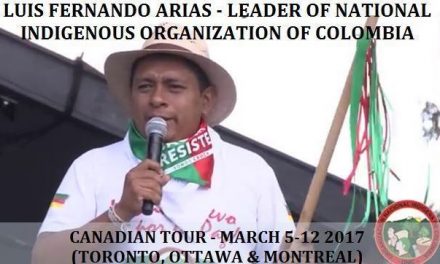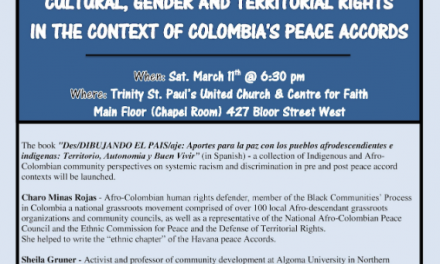Letter to President Juan Manuel Santos of Colombia
President Juan Manuel Santos
Members of the Commission to Monitor, Promote, and Verify Implementation of Colombia’s Peace Accord (CSIVI)
Dear President Santos and CSIVI Members,
The undersigned gender, racial, social and environmental justice organizations and advocates from around the world applaud the inclusion of the Ethnic Chapter and other racial and gender rights measures in Colombia’s Peace Accord. If implemented, these provisions will allow Colombia to set a global example of holistic peacebuilding—one that meaningfully addresses the social inequalities that help fuel conflict. We are, however, deeply concerned about the inadequate consultation with and recognition of Afro-Colombian and Indigenous authorities in peace implementation activities to date, and the ways in which this endangers the lives, security, and territorial and human rights of Afro-Descendant and Indigenous Peoples, including women and girls. We encourage the Government to act in good faith to ensure that Indigenous and Afro- Descendant Peoples’ rights are maintained and furthered in peace implementation.
It is crucial that the framework plan for implementing the Peace Accord contain indicators to measure the progress and outcomes of policies, programs and reforms in a manner that corresponds to the needs, values, and rights of Indigenous and Afro-Descendant Peoples, including their gender-based rights. These can only be developed with meaningful participation of their respective authorities and organizations. We understand that the Government and CSIVI recently agreed to a work agenda with the Special High-Level Body for Ethnic Peoples to develop and include such indicators and to assign resources and provide conditions for meaningful participation of Afro-Descendant and Indigenous Peoples in implementation. This is positive news, as we believe inclusiveness at the outset of the framework plan will help ensure structural advances for Afro-Colombian and Indigenous Peoples, who have disproportionately born the consequences of the armed conflict, and whose communities suffer the greatest levels of poverty and least access to health and educational infrastructure in Colombia.
While it is cause for hope that the Government and CSIVI agreed to this agenda of work, a broader pattern of exclusion keeps us vigilant. For example, while the Peace Accord requires the Government to include an ethnic and cultural perspective in implementing its Security and Protection Program, the parties have failed to meaningfully consult with and support Afro- Colombian and Indigenous authorities and communities in the design and implementation of community based self-protection plans, and to ensure adequate security overall in their territories. As FARC fighters demobilized, paramilitaries and other armed actors have filled power vacuum in many areas, as was predicted by parties to the Accord, which named these actors the “greatest threat” to peace. The site of the majority of fighting during the conflict, these areas heavily overlap with Afro-Colombian and Indigenous territories. Because of the lack of consultation and ensuing insecurity, entire Afro-Colombian and Indigenous communities are again facing displacement, as violence, forced disappearances, attacks on human rights defenders, threats, and kidnappings increase. The forced displacement rate increased in the first half of 2017, as compared with the first half of 2016, with Afro-Colombian and Indigenous Peoples comprising 94% of those displaced in the first months of 2017.
Document sponsored and signed by:
Black Alliance for Peace
Common Frontiers
Human Rights and Gender Justice Clinic- CUNY School of Law
MADRE
NORDIK Institute at Algoma University
Washington Office on Latin America





